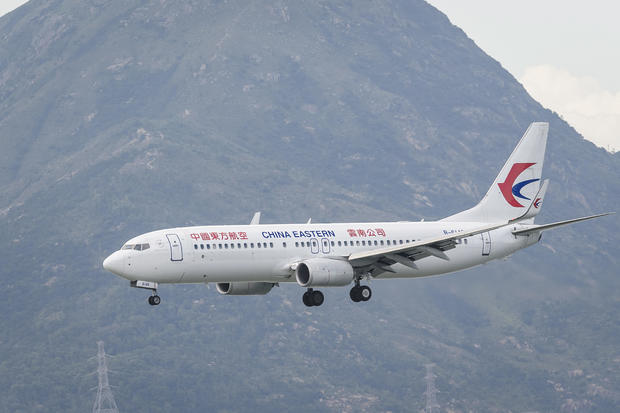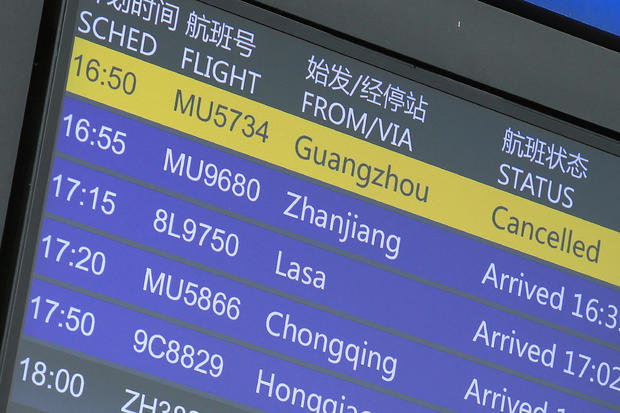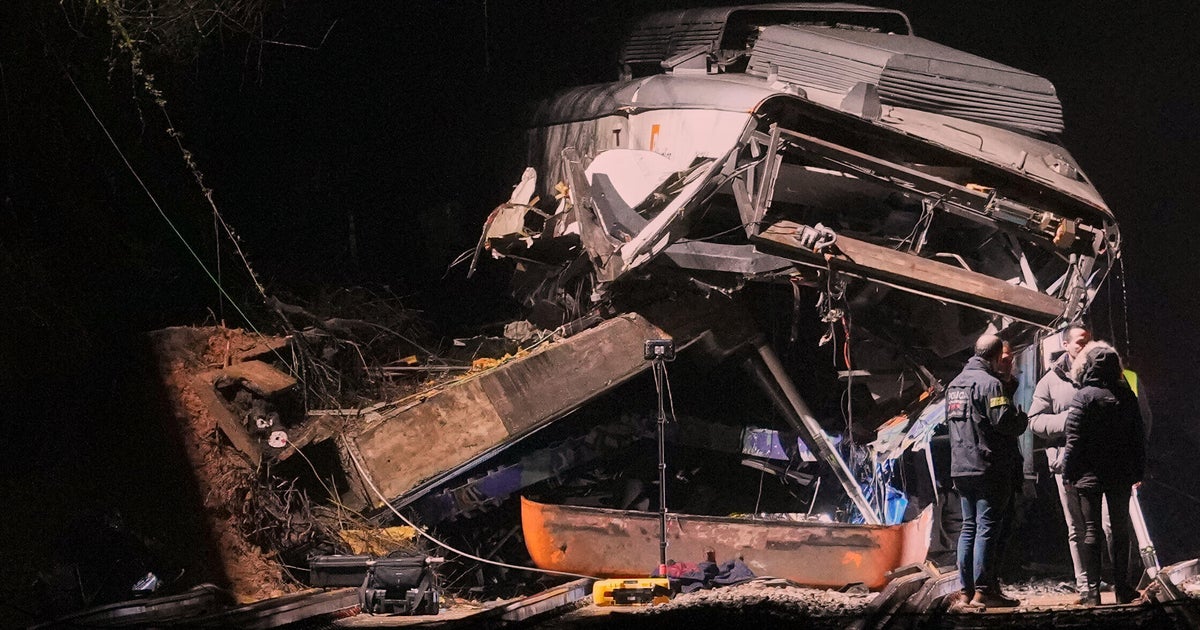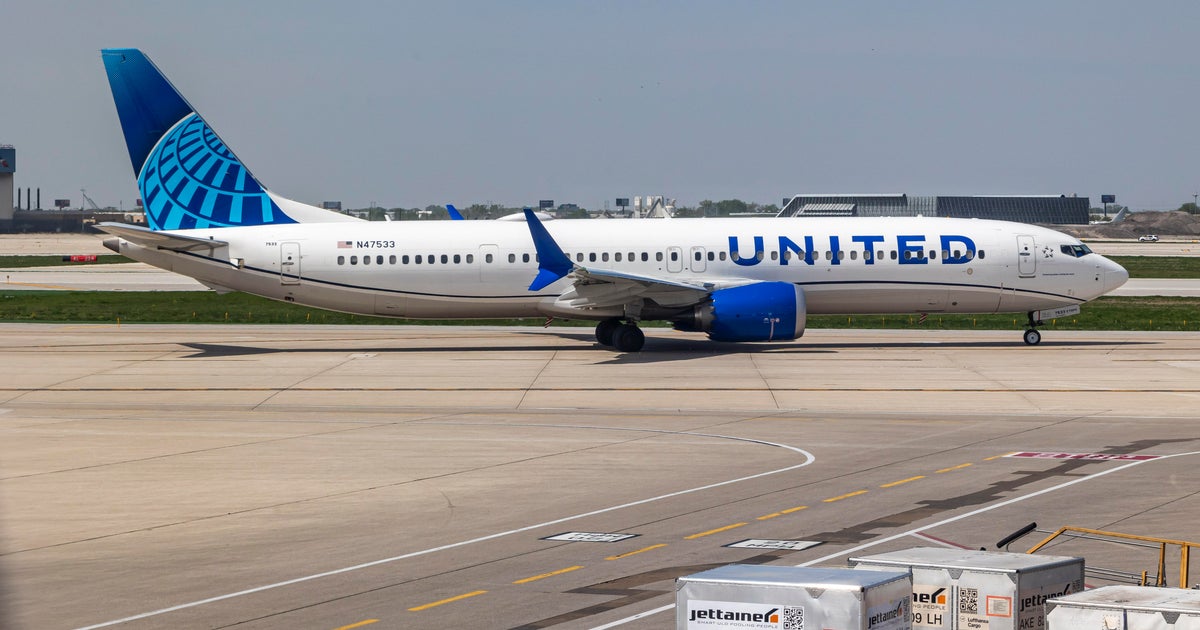China Eastern Airlines confirms fatalities after Boeing 737 crashes in Guangxi region with 132 on board
Beijing — A China Eastern passenger jet carrying 132 people crashed in southern China on Monday, aviation authorities said. China's state-run media said the crash led to a fire on a mountain.
Chinese state media said that as of Tuesday, no survivors had been found, according to The Associated Press. Chinese state TV reported there were no foreigners on board.
China Eastern said the cause of the crash was "still under investigation" and it did not provide any detail, but in an official filing with the Shanghai Stock Exchange it expressed "its deep condolences for the passengers and crew members who died in the plane crash."
The Boeing 737-800 from Kunming city to the southern hub of Guangzhou "lost airborne contact over Wuzhou" city in the Guangxi region, the Civil Aviation Administration of China (CAAC) said earlier.
"At present, it has been confirmed that this flight has crashed," the CAAC said, adding that it had activated its emergency response and "dispatched a working group to the scene." The plane was carrying 123 passengers and 9 flight crew members, the CAAC said. An earlier state media report had said there were 133 people on board.
State broadcaster CCTV said the plane crashed in Teng county near Wuzhou and "caused a mountain fire," citing the provincial emergency management bureau. The crash site was about 150 miles from the destination of Guangzhou, meaning the aircraft had traveled about 500 miles before coming down.
Tracking data showed the flight was traveling at a normal cruising altitude of about 30,000 feet when it suddenly went into a deep dive. The aircraft then briefly climbed 1,000 feet before the data abruptly ends, about 40 seconds later. The data suggest the plane crashed within about 90 seconds of whatever first sent it plummeting toward the ground.
Chicago-based Boeing Co. said it was aware of the initial reports of the crash and was "working to gather more information." Boeing stock dropped over 8% in pre-market trading early Monday.
After the crash on Monday, Chinese financial news outlet Yicai, based in the economic hub of Shanghai, reported that China Eastern was going to ground all of its 737-800s pending an investigation, but the airline did not immediately confirm the move.
The state-run tabloid People's Daily said 117 rescuers were working at the crash site and that 650 more rescuers and firefighters, organized by the Guangxi fire department, were heading to the site. The Guangxi fire service said crews were battling to extinguish a blaze on a hillside sparked by the crash, and satellite data from NASA showed a massive fire in the area.
CCTV said China Eastern had established nine separate teams to work on everything from disposal of the wreckage to the crash investigation and passenger family assistance.
"We are shocked to learn of the China Eastern MU5735 accident," Chinese President Xi Jinping was quoted as saying by CCTV. He called for "all efforts" to be taken to rescue any survivors and to find out the "cause of the accident as soon as possible."
There was no immediate response from China Eastern when contacted by CBS News on Monday. The airline changed its website to black and white colors on Monday afternoon.
Flight tracker FlightRadar24 showed no more data for flight MU5735 after 2:22 pm local time, when it reached the area around Wuzhou. It showed the plane dropping sharply from an altitude of 29,100 feet to 3,225 feet in less than three minutes, before flight information stopped.
The plane was delivered to China Eastern by Boeing in June 2015, according to The Associated Press.
The twin-engine, single aisle Boeing 737 is one of the world's most widely-used passenger jets for short and medium-haul flights. China Eastern operates various versions of the 737, including the 737-800, which crashed on Monday, and the 737 Max, which was grounded worldwide after two fatal crashes.
Robert Sumwalt, a former chairman of the National Transportation Safety Board, said the 737-800 "has had a very good safety record over the years."
But he said it's unlikely there will be survivors.
"I hate to say so, but I do not believe there's any chance that anybody would have survived a crash like this," Sumwalt told CBS News' Seth Doane.
China's aviation regulator only cleared the Max to return to service late last year — the last national regulator to do so in a major travel market.
CBS News correspondent Kris Van Cleave said the 737-800 is part of the "next generation" family of Boeing's 737 line-up. More than 7,000 have been built, with fewer than 25 accidents that rendered the planes unusable since they first took flight in 1997. Van Cleave said unverified video purportedly showing the plane in a steep nose-down dive right before it crashed matches the early flight data available from flight tracking websites. The incredibly steep dive shown in the video — a near-90 degree angle — is very unusual in an aviation accident.
The U.S. Federal Aviation Authority told CBS News in a statement on Monday that it was "aware of reports that a China Eastern Airlines Boeing 737-800 plane crashed" in China. The agency said it stood ready to assist in the crash investigation "if asked" to do so by Chinese authorities, along with the National Transportation Safety Board, but it noted that China would take the lead by default.
One villager told a local news site that the plane involved in the crash had "completely fallen apart" and he had seen nearby forest areas destroyed by a fire caused when the plane crashed onto the mountainside.
Fears for the fate of the jet spread on Monday afternoon as local media reported that China Eastern flight MU5735 had not arrived as planned in Guangzhou after taking off from Kunming shortly after 1:00 pm (0500 GMT).
China had enjoyed an enviable air safety record in recent years in a country criss-crossed by newly built airports and serviced by new airlines established to match the country's breakneck growth over the last few decades.
A Henan Airlines flight crashed in northeastern Heilongjiang province in 2010, killing at least 42 out of 92 people on board although the final toll was never confirmed.
It was the last Chinese commercial passenger flight crash that caused civilian casualties. The deadliest Chinese commercial flight crash was a China Northwest Airlines crash in 1994 which killed all 160 onboard.
Most of the passengers onboard the Malaysia Airlines Flight MH370, which disappeared in March 2014 en route from Kuala Lumpur to Beijing, were from China.












